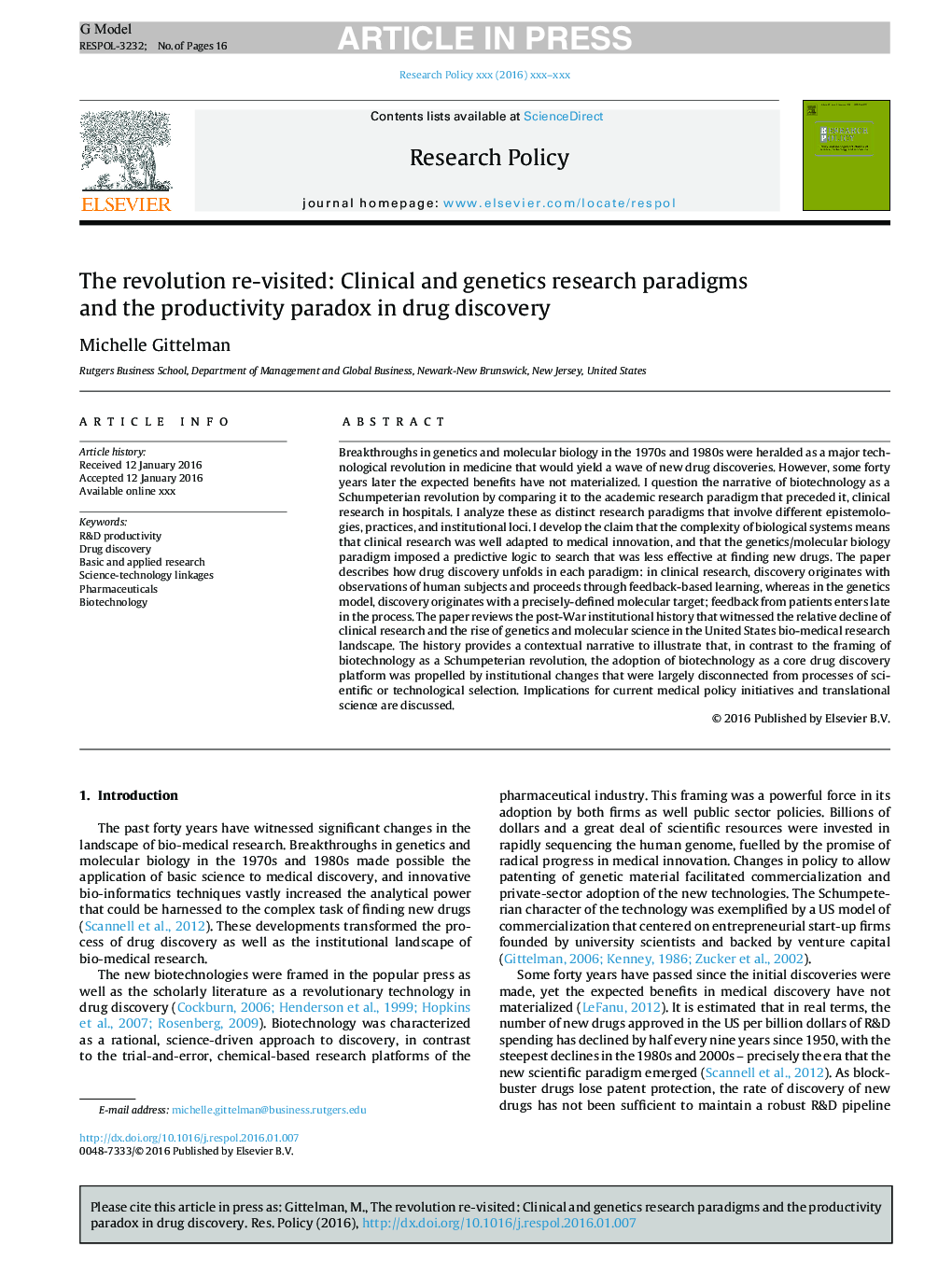| کد مقاله | کد نشریه | سال انتشار | مقاله انگلیسی | نسخه تمام متن |
|---|---|---|---|---|
| 5103965 | 1377411 | 2016 | 16 صفحه PDF | دانلود رایگان |
عنوان انگلیسی مقاله ISI
The revolution re-visited: Clinical and genetics research paradigms and the productivity paradox in drug discovery
ترجمه فارسی عنوان
انقلاب دوباره بازدید: پارادایم های تحقیقاتی بالینی و ژنتیک و پارادوکس بهره وری در کشف مواد مخدر
دانلود مقاله + سفارش ترجمه
دانلود مقاله ISI انگلیسی
رایگان برای ایرانیان
کلمات کلیدی
ترجمه چکیده
دستیابی به موفقیت در ژنتیک و زیست شناسی مولکولی در دهه 1970 و 1980 به عنوان یک انقلاب تکنولوژیکی عمده در پزشکی مطرح شد که موجی از اکتشافات جدید مواد مخدر را به وجود آورد. با این حال، چهل سال بعد، مزایای مورد انتظار آن را تحقق نیافته اند. من روایت بیوتکنولوژی را به عنوان یک انقلاب شومپیتری با مقایسه آن با پارادایم تحقیقاتی علمی پیش از آن، تحقیقات بالینی در بیمارستان ها مطرح می کنم. من این را به عنوان پارادایم های متمایز تحقیقاتی که شامل معرفت شناسی های مختلف، شیوه ها و شیوه های نهادی هستند، تحلیل می کنم. من ادعا می کنم که پیچیدگی سیستم های بیولوژیک به این معنی است که تحقیقات بالینی با نوآوری های پزشکی سازگار بوده و پارادایم زیست شناسی ژنتیک / مولکولی یک منطق پیش بینی را برای جستجوی آن در یافتن داروهای جدید مؤثرتر تحمیل کرده است. این مقاله نشان می دهد که چگونه کشف مواد مخدر در هر پارادایم گشوده می شود: در تحقیقات بالینی، کشف از مشاهدات افراد انسانی و از طریق یادگیری مبتنی بر بازخورد حاصل می شود، در حالی که در مدل ژنتیک کشف با یک هدف مولکولی دقیق تعریف می شود؛ بازخورد از بیماران در اواخر روند وارد می شود. مقاله بررسی تاریخ نهادی پس از جنگ است که شاهد کاهش نسبی تحقیقات بالینی و افزایش ژنتیک و علم مولکولی در چشم انداز تحقیقات زیست پزشکی پزشکی ایالات متحده است. تاریخ یک روایت متنی را نشان می دهد که نشان می دهد که در مقایسه با تدوین بیوتکنولوژی به عنوان یک انقلاب شومپیتر، پذیرش بیوتکنولوژی به عنوان یک پلتفرم کشف اصلی هسته ای، با تغییرات نهادی که عمدتا از پروسه های انتخاب علمی یا تکنولوژیک جدا شده بود، رانده شد. مفاهیم مربوط به ابتکارات سیاست های پزشکی و علوم تجربی مورد بحث قرار گرفته است.
موضوعات مرتبط
علوم انسانی و اجتماعی
مدیریت، کسب و کار و حسابداری
کسب و کار و مدیریت بین المللی
چکیده انگلیسی
Breakthroughs in genetics and molecular biology in the 1970s and 1980s were heralded as a major technological revolution in medicine that would yield a wave of new drug discoveries. However, some forty years later the expected benefits have not materialized. I question the narrative of biotechnology as a Schumpeterian revolution by comparing it to the academic research paradigm that preceded it, clinical research in hospitals. I analyze these as distinct research paradigms that involve different epistemologies, practices, and institutional loci. I develop the claim that the complexity of biological systems means that clinical research was well adapted to medical innovation, and that the genetics/molecular biology paradigm imposed a predictive logic to search that was less effective at finding new drugs. The paper describes how drug discovery unfolds in each paradigm: in clinical research, discovery originates with observations of human subjects and proceeds through feedback-based learning, whereas in the genetics model, discovery originates with a precisely-defined molecular target; feedback from patients enters late in the process. The paper reviews the post-War institutional history that witnessed the relative decline of clinical research and the rise of genetics and molecular science in the United States bio-medical research landscape. The history provides a contextual narrative to illustrate that, in contrast to the framing of biotechnology as a Schumpeterian revolution, the adoption of biotechnology as a core drug discovery platform was propelled by institutional changes that were largely disconnected from processes of scientific or technological selection. Implications for current medical policy initiatives and translational science are discussed.
ناشر
Database: Elsevier - ScienceDirect (ساینس دایرکت)
Journal: Research Policy - Volume 45, Issue 8, October 2016, Pages 1570-1585
Journal: Research Policy - Volume 45, Issue 8, October 2016, Pages 1570-1585
نویسندگان
Michelle Gittelman,
